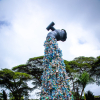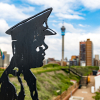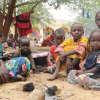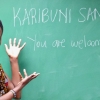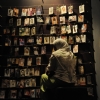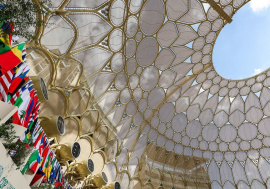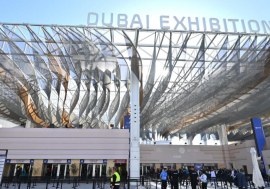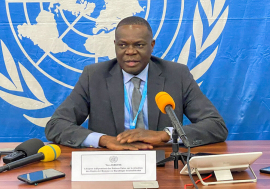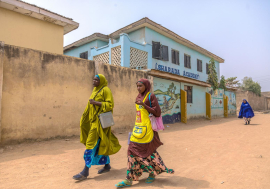Africa seeks to tap its diaspora
Africa seeks to tap its diaspora
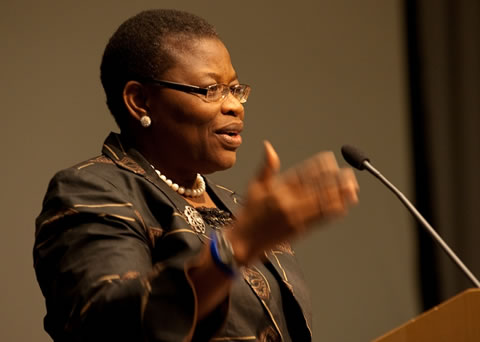 “It is important to look strategically at the diaspora’s role in African development,” Obiagali Ezekwesili, the World Bank’s vice president for Africa, told African expatriates.
“It is important to look strategically at the diaspora’s role in African development,” Obiagali Ezekwesili, the World Bank’s vice president for Africa, told African expatriates.To understand the potential of Africans living outside Africa to contribute to their continent’s social and economic progress, one only had to attend the opening of an “African diaspora open house” held in the US capital. The 400-seat auditorium at World Bank headquarters was packed with doctors and lawyers, engineers and architects, scientists, professors and entrepreneurs who had left their home countries in search of better lives overseas. But they still wanted to explore how they could participate in building a prosperous and democratic Africa.
Obiagali Ezekwesili, the World Bank’s vice president for Africa, noted that remittances from the diaspora, estimated at some $32-40 bn annually, now exceeds official development assistance to the region. “Beyond wealth,” she added, Africans in the diaspora have “the skills and knowledge that would need to be mobilized” to promote the continent’s advancement. “It is therefore important to look strategically at the diaspora’s role in African development.”
During the daylong series of panels and workshops on 25 February, participants engaged senior World Bank officials on everything from creating bonds for starting micro-enterprises back home to creating a diaspora skills database that could be used by African governments and international development agencies.
The World Bank launched its African diaspora programme in 2007, the same year it organized its first African diaspora conference. In 2008 it partnered with the African Union (AU), which has designated the diaspora as one of Africa’s six regions.
Dr. Jimni Adisi, speaking for the AU Commission, noted that the pan-African body has reserved 20 seats in its Economic, Social and Cultural Council for representatives of civil society groups in the diaspora. “The next step,” he told participants at the open house, “would be to explore how the diaspora participates in all of the other institutions” of the AU. To be eligible, he said, such representatives “must have a bloodline, must be dispersed outside the continent and must commit to building the African Union.”
‘A foot in two worlds’
For all the good will and commitment in evidence at the open house, there also were frank acknowledgements of the challenges ahead. Sierra Leone’s ambassador to the US, Bockari Kortu Stevens, recounted the case of a highly skilled Sierra Leonean expatriate who was personally recruited by the president for a senior post in the mining ministry. Although excited to be able to “give back” to his country, the expatriate felt compelled to return to the US because his local salary could not even cover his family’s health insurance costs. “He had a foot in two worlds — one in his adopted home and one in Sierra Leone — and he couldn’t stay in them both,” Mr. Stevens noted. “These are some of the practical and human problems we face.”
Richard Cambridge, head of the World Bank’s diaspora programme, candidly acknowledged that the first open house in 2007 had little follow-through and was marked by divergent expectations. The attempt to create a skills bank, he said, amounted to little more than collecting business cards and giving them to the Bank’s project managers in Africa, with few results.
Ibedia Alltrade, president of a non-profit group 100 Hours for Nigeria, based in Hartford, Connecticut, in the US, agreed. “Nothing came out of the 2007 meeting,” he told Africa Renewal. “We know what the Bank wants from us, but it isn’t clear what we get from the Bank.” The diaspora, he noted, is already sending money home to families and supporting community projects through hometown associations. He suggested that the World Bank provide clearer information about how it operates and plan future meetings jointly with members of the diaspora.
Adjusting expectations
Both the World Bank and the diaspora need to work harder on their relationship, Ntal Alimasi, a former World Bank consultant who now heads the National Association of African Catholics in the US, told Africa Renewal. World Bank officials “realize that many of their big projects have failed once they hit the ground in Africa,” he said. “They know the diaspora can help them reach the villages and be a bridge to the communities.”
Mr. Alimasi also noted that many of those who came to the 2007 meeting had unrealistic expectations. “They came thinking they could change the way the Bank operates, and maybe pick up a contract here and there. That’s just not realistic. We should be thinking about how to hold the Bank more accountable for its programmes in Africa, not trying to change it from outside.”
It is important for members of the diaspora and officials of the World Bank to find ways in which “everybody’s interests get served.” Whether the World Bank, the African Union and the diaspora can forge a more effective partnership remains to be seen, Mr. Alimasi concluded. “But I’ve spent my day here. I’m giving them the benefit of the doubt.”
– Africa Renewal online


